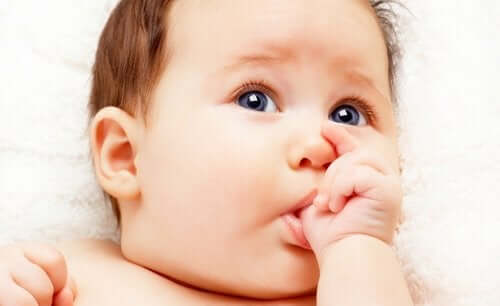Is It Good for Babies to Suck Their Thumbs?


Reviewed and approved by the psychologist María Alejandra Castro Arbeláez
One of the most common reflexes in children from the time they’re born to approximately two years of age is to put their fingers in their mouth and suck. The reason for this action can be attributed to several factors, but at the end of the day, it’s normal for parents to ask themselves if it’s good for babies to suck their thumbs?
According to pediatricians and orthodontists, this action doesn’t imply any risk for your baby, as long as it doesn’t become a habit and that, if possible, the child stops doing it around two years of age. Below, we’ll delve into this tender behavior.
Is it good for babies to suck their thumbs?
The answer is yes; First of all, it must be confirmed that this action is completely normal. It is a reflex that many children have even from the first day of birth; in some cases, it has even been claimed that they also do it in the womb.
Thumb sucking is associated with several factors; at first, the baby does it as a reflex every time they bring their hands close to their mouth. This sucking instinct will help them learn which way to move their lips so they can feed, whether it’s through the breast or a bottle.

From the fifth or sixth month of the child’s life, they’ll stop sucking as a reflex; instead, this action of sucking to be able to feed will become more rational. From that moment on, children will also use their mouths to explore or learn more about the objects that are within their reach, as well as their bodies. That’s one reason why they may be constantly sticking their fingers in their mouths.
Finally, the third reason why children suck their thumbs is that, in the long run, they’re developing a habit that’s quite difficult to abandon. And the reason is that children suck their thumbs to feel safe, calm, relaxed, and to be able to fall asleep.
It’s a reflex that many children have even from the first day of birth; in some cases, it’s even been said that they also do so in the womb.
The benefits of thumb sucking
We already know why children suck their thumb; Now we must answer the eternal question: Is it good for babies to suck their thumbs? To talk about the benefits of this action, we can list these facts:
- Children who suck their thumbs have fewer problems falling asleep. In turn, they tend to sleep more soundly at night, without being interrupted.
- These little ones don’t tend to get stressed easily. It’s become evident that in situations in which they feel fear, or for example, they’re sad because of the absence of their parents, sucking their thumbs quickly comforts them.
- When children suck on their thumbs, they can also signal to parents that they’re hungry or sleepy, which helps adults identify what their baby’s needs are at the moment.

Thumb Sucking Considerations
Although thumb sucking has several benefits for young children, it’s important that we bear in mind certain aspects related to hygiene to ensure that this action doesn’t have negative effects.
The first thing is that, if the child is already of crawling age, parents should be careful to wash their hands regularly, so that they’re not exposed to worms, parasites, and bacteria when they put their fingers in their mouths.
The second consideration regarding thumb sucking is that if a child does it too often, it may somehow change the shape of their nail and cuticle. If this happens, you should be on alert to go to the dermatologist.
The third consideration is that thumb sucking is quite difficult to break. Therefore, you must be patient when you want to teach your little one to stop the habit.
Lastly, you should know that orthodontists recommend that parents try to stop children from thumb sucking no later than age five. Otherwise, the shape of the lips, gums, jaws, and teeth may be impaired in some way.
One of the most common reflexes in children from the time they’re born to approximately two years of age is to put their fingers in their mouth and suck. The reason for this action can be attributed to several factors, but at the end of the day, it’s normal for parents to ask themselves if it’s good for babies to suck their thumbs?
According to pediatricians and orthodontists, this action doesn’t imply any risk for your baby, as long as it doesn’t become a habit and that, if possible, the child stops doing it around two years of age. Below, we’ll delve into this tender behavior.
Is it good for babies to suck their thumbs?
The answer is yes; First of all, it must be confirmed that this action is completely normal. It is a reflex that many children have even from the first day of birth; in some cases, it has even been claimed that they also do it in the womb.
Thumb sucking is associated with several factors; at first, the baby does it as a reflex every time they bring their hands close to their mouth. This sucking instinct will help them learn which way to move their lips so they can feed, whether it’s through the breast or a bottle.

From the fifth or sixth month of the child’s life, they’ll stop sucking as a reflex; instead, this action of sucking to be able to feed will become more rational. From that moment on, children will also use their mouths to explore or learn more about the objects that are within their reach, as well as their bodies. That’s one reason why they may be constantly sticking their fingers in their mouths.
Finally, the third reason why children suck their thumbs is that, in the long run, they’re developing a habit that’s quite difficult to abandon. And the reason is that children suck their thumbs to feel safe, calm, relaxed, and to be able to fall asleep.
It’s a reflex that many children have even from the first day of birth; in some cases, it’s even been said that they also do so in the womb.
The benefits of thumb sucking
We already know why children suck their thumb; Now we must answer the eternal question: Is it good for babies to suck their thumbs? To talk about the benefits of this action, we can list these facts:
- Children who suck their thumbs have fewer problems falling asleep. In turn, they tend to sleep more soundly at night, without being interrupted.
- These little ones don’t tend to get stressed easily. It’s become evident that in situations in which they feel fear, or for example, they’re sad because of the absence of their parents, sucking their thumbs quickly comforts them.
- When children suck on their thumbs, they can also signal to parents that they’re hungry or sleepy, which helps adults identify what their baby’s needs are at the moment.

Thumb Sucking Considerations
Although thumb sucking has several benefits for young children, it’s important that we bear in mind certain aspects related to hygiene to ensure that this action doesn’t have negative effects.
The first thing is that, if the child is already of crawling age, parents should be careful to wash their hands regularly, so that they’re not exposed to worms, parasites, and bacteria when they put their fingers in their mouths.
The second consideration regarding thumb sucking is that if a child does it too often, it may somehow change the shape of their nail and cuticle. If this happens, you should be on alert to go to the dermatologist.
The third consideration is that thumb sucking is quite difficult to break. Therefore, you must be patient when you want to teach your little one to stop the habit.
Lastly, you should know that orthodontists recommend that parents try to stop children from thumb sucking no later than age five. Otherwise, the shape of the lips, gums, jaws, and teeth may be impaired in some way.
All cited sources were thoroughly reviewed by our team to ensure their quality, reliability, currency, and validity. The bibliography of this article was considered reliable and of academic or scientific accuracy.
- Coronel, K. D., & Jácome, H. G. (2019). EFECTOS CAUSADOS POR EL HÁBITO DE SUCCIÓN DIGITAL EN ETAPA INFANTIL. Revista Científica Especialidades Odontológicas UG, 2(1). https://revistas.ug.edu.ec/index.php/eoug/article/view/26/20
- Del Carmen Lanazca, H. R. (2021). Tratamiento de mordida abierta anterior por hábito de succión digital. http://190.223.61.66/handle/20.500.12848/2628
- Flórez Tapias, M. Á., Grillo Santander, J. S., & Reyes Serrano, C. A. (2016). Manejo del hábito de succión digital en niños de 2 a 15 años. https://repository.usta.edu.co/handle/11634/1644
- Larsson, E. (1988). Treatment of children with a prolonged dummy or finger-sucking habit. The European Journal of Orthodontics, 10(1), 244-248. https://academic.oup.com/ejo/article-abstract/10/1/244/457977
- Cerny, R. (1981). Thumb and finger sucking. Australian dental journal, 26(3), 167-171. https://onlinelibrary.wiley.com/doi/abs/10.1111/j.1834-7819.1981.tb03938.x
- Pearson, G. H. (1948) The psychology of finger-sucking, tongue-sucking, and other oral “habits”. American Journal of Orthodontics and Dentofacial Orthopedics, 34(7), 589-598. https://www.ajodo.org/article/0002-9416(48)90157-2/pdf
- Lewis, S. J. (1937). The effect of thumb and finger sucking on the primary teeth and dental arches. Child Development, 8(1), 93-98. https://www.jstor.org/stable/1125827
- Levy, D. M. (1928). Fingersucking and accessory movements in early infancy: An etiologic study. American Journal of Psychiatry, 84(6), 881-918. https://ajp.psychiatryonline.org/doi/pdf/10.1176/ajp.84.6.881.
- Barranquero M. La ecografía 3D en el embarazo: ventajas e inconvenientes. Disponible en: https://www.reproduccionasistida.org/ecografia-3d/.
- MedlinePlus. Reflejos en los bebés. Disponible en: https://medlineplus.gov/spanish/ency/article/003292.htm.
- Enfamil. ¿Cuándo empieza a gatear el bebé? Disponible en: https://www.enfamil.es/blogs/desarrollo-de-mi-bebe/cuando-empieza-a-gatear-el-bebe.
This text is provided for informational purposes only and does not replace consultation with a professional. If in doubt, consult your specialist.








